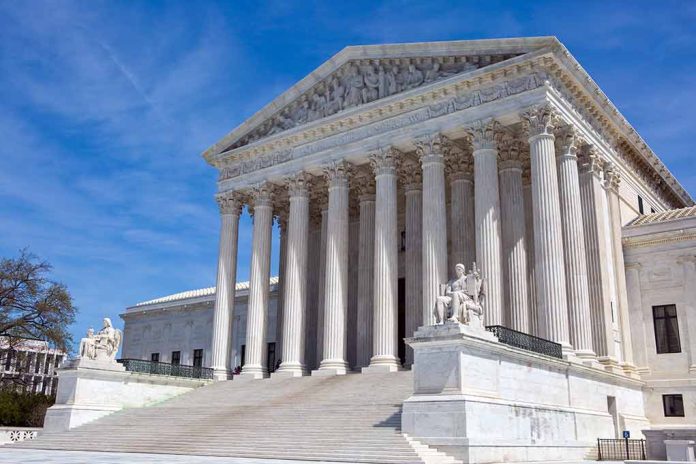
The Supreme Court has upheld a gag order in Donald Trump’s Manhattan trial, dealing a blow to the former president’s legal strategy.
At a Glance
- Supreme Court declines to lift gag order on Trump in New York criminal case
- Justice Samuel Alito handles denial, marking second time justices upheld restrictions
- Gag order protects jurors, court staff, and their families from Trump’s statements
- Trump argues remaining restrictions infringe on his First Amendment rights
- Manhattan DA expected to file motion to uphold conviction, suggesting sentencing could resume after 2029
Supreme Court Upholds Gag Order
The Supreme Court has declined to lift a gag order imposed on President-elect Donald Trump in his New York criminal case. This decision, handled by Justice Samuel Alito, marks the second time this year that the justices have upheld restrictions on Trump’s speech related to the case. The gag order specifically prohibits Trump from making statements about jurors, court staff, and their families.
The gag order was initially put in place before Trump’s May conviction on 34 felony counts related to falsifying business records from hush money payments to Stormy Daniels. While Judge Juan Merchan partially lifted some aspects of the order, he maintained provisions to protect court personnel and jurors.
The Supreme Court once again declined to the lift Manhattan Judge Juan Merchan's gag order on President-elect Donald Trump over his trial on charges of falsifying business records that resulted in a conviction in May on 34 felony counts. https://t.co/j3zJZM1dVq
— NEWSMAX (@NEWSMAX) December 9, 2024
Trump’s Legal Challenge
Trump’s legal team has argued that the remaining restrictions infringe on his First Amendment rights. They have requested the dismissal of the conviction, citing comments made by President Joe Biden about his son Hunter Biden’s prosecution. Trump’s attorneys claim that these statements demonstrate a double standard in the application of justice.
Judge Merchan has delayed Trump’s sentencing while considering arguments on whether Trump is immune from criminal prosecution given his return to The Oval Office. This delay adds another layer of complexity to an already intricate legal battle.
Implications and Future Proceedings
The status of the conviction remains uncertain, his federal criminal cases have been dismissed, raising questions about the potential impact on state-level proceedings. Trump is also challenging an indictment in Georgia related to the 2020 election results in Fulton County, further complicating his legal landscape.
Manhattan District Attorney Alvin Bragg is expected to file a motion to uphold the conviction. Bragg has suggested that sentencing could resume after Trump’s second term ends in 2029, indicating a long-term strategy in handling this high-profile case. As the legal proceedings continue to unfold, the implications of this gag order and its impact on Trump’s political future remain subjects of intense scrutiny and debate.
Sources:
Supreme Court rejects Trump bid to lift New York trial gag order
Supreme Court Declines to Lift Judge Merchan’s Gag Order on Trump



